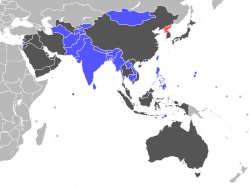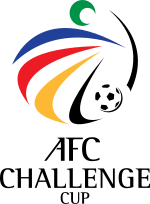AFC Challenge Cup
|
Official logo of the AFC Challenge Cup | |
| Founded | 2006 |
|---|---|
| Abolished | 2014 |
| Region | Asia (AFC) |
| Number of teams | 8 (at the finals) |
| Last champions |
(1st title) |
| Most successful team(s) |
(2 titles) |
| Website | Official website |
The AFC Challenge Cup was an international football competition for Asian Football Confederation (AFC) member countries that was categorized as "emerging countries" in the "Vision Asia" programme.[1] "Vision Asia", created by former AFC president, Mohammed Bin Hammam, is the AFC's plan for a continent wide programme to raise the standards of Asian football at all levels.[2] The AFC Challenge Cup, which reflected the philosophy of Vision Asia, was created for teams to experience playing in a continental competition with the possibility to win an AFC trophy and to potentially discover new talent.[3]
The inaugural tournament was hosted by Bangladesh in 2006 and is held biennially. An amendment to men's national team competitions in July 2006, meant that starting with the 2008 and 2010 editions of the AFC Challenge Cup, the winners automatically qualify for the AFC Asian Cup.[4]
In the 2011 and 2015 AFC Asian Cup tournaments, two qualification spots have been allocated to the two most recent AFC Challenge Cup winners. The 2014 tournament was the last edition of this competition, due to the expansion of the Asian Cup to the 24-nations format from the 16-nations one after the 2015 edition.[5][6]
Selection of teams
The AFC initially divided their 46 member nations into three groups in 2006. Although the tournament is meant for the countries of emerging associations class, some countries from the developing associations class and even the developed associations class have participated in the qualification and the finals of the tournament such as India, Maldives, Myanmar, North Korea, Tajikistan and Turkmenistan. As a result, only one team from the emerging class ever won the tournament, when Palestine won in 2014. In late March 2012, the Northern Mariana Islands Football Association, although only an associate member of the AFC, was approved by the AFC to enter their national team in the competition.[7] In November 2012, the AFC announced North Korea's exclusion from future AFC Challenge Cups.[8]
|
The top 15 are classed as developed associations: |
The next 14 are classed as developing associations: |

The last 17 are classed as emerging associations, which need time to develop their football. They are eligible in the AFC Challenge Cup. These are the teams which participate:
Results
| Year | Host | Final | Losing semi-finalists | Number of teams | ||||
|---|---|---|---|---|---|---|---|---|
| Winner | Score | Runner-up | ||||||
| 2006 Details |
Bangladesh |
Tajikistan |
4–0 | Sri Lanka |
|
16 | ||
| Year | Host | Final | Third place match | Number of teams | ||||
| Winner | Score | Runner-up | Third place | Score | Fourth place | |||
| 2008 Details |
India |
India |
4–1 | Tajikistan |
North Korea |
4–0 | Myanmar |
8 |
| 2010 Details |
Sri Lanka |
North Korea |
1–1 (a.e.t.) (5–4 pens.) |
Turkmenistan |
Tajikistan |
1–0 | Myanmar |
8 |
| 2012 Details |
Nepal |
North Korea |
2–1 | Turkmenistan |
Philippines |
4–3 | Palestine |
8 |
| 2014 Details |
Maldives |
Palestine |
1–0 | Philippines |
Maldives |
1–1 (a.e.t.) (8–7 pens.) |
Afghanistan |
8 |
Successful national teams
| Team | Champion | Runners-up | Third place | Fourth place |
|---|---|---|---|---|
| |
2 (2010, 2012) | 1 (2008) | ||
| |
1 (2006) | 1 (2008) | 1 (2010) | |
| |
1 (2014) | 1 (2012) | ||
| |
1 (2008) | |||
| |
2 (2010, 2012) | |||
| |
1 (2014) | 1 (2012) | ||
| |
1 (2006) | |||
| |
1 (2006^) | |||
| |
1 (2006^) | |||
| |
1 (2014) | |||
| |
2 (2008, 2010) | |||
| |
1 (2014) | |||
Participating nations

- Legend
|
|
For each tournament, the number of teams in each of the finals tournament are shown.
| Teams | 2006 (16 teams) |
2008 (8 teams) |
2010 (8 teams) |
2012 (8 teams) |
2014 (8 teams) |
Years |
|---|---|---|---|---|---|---|
| |
GS | GS | × | • | 4th | 3 |
| |
QF | • | GS | • | • | 2 |
| |
GS | • | • | • | • | 1 |
| |
GS | • | • | × | × | 1 |
| |
GS | • | • | • | • | 1 |
| |
QF | • | • | • | • | 1 |
| |
GS | • | • | • | • | 1 |
| |
QF | 1st | GS | GS | • | 4 |
| |
SF | • | GS | • | GS | 3 |
| |
• | × | • | • | GS | 1 |
| |
GS | • | • | • | • | 1 |
| |
‡ | ‡ | • | GS | 3rd | 2 |
| |
• | × | • | • | • | 0 |
| |
‡ | 4th | 4th | • | GS | 3 |
| |
SF | GS | • | GS | • | 3 |
| |
‡ | 3rd | 1st | 1st | ‡ | 3 |
| |
‡ | ‡ | ‡ | ‡ | • | 0 |
| |
GS | • | • | • | • | 1 |
| |
QF | × | • | 4th | 1st | 3 |
| |
GS | • | • | 3rd | 2nd | 3 |
| |
2nd | GS | GS | • | • | 3 |
| |
1st | 2nd | 3rd | GS | • | 4 |
| |
× | × | × | × | × | 0 |
| |
‡ | GS | 2nd | 2nd | GS | 4 |
General statistics
| Team | Pld | W | D | L | GF | GA | GD | Pts. |
|---|---|---|---|---|---|---|---|---|
| |
15 | 12 | 2 | 1 | 35 | 4 | +31 | 38 |
| |
19 | 11 | 2 | 6 | 36 | 16 | +20 | 34 |
| |
16 | 8 | 4 | 4 | 27 | 14 | +13 | 28 |
| |
14 | 8 | 3 | 3 | 29 | 8 | +21 | 27 |
| |
13 | 6 | 3 | 4 | 18 | 14 | +4 | 21 |
| |
15 | 5 | 3 | 7 | 13 | 21 | −8 | 18 |
| |
11 | 5 | 0 | 6 | 7 | 12 | −5 | 15 |
| |
13 | 5 | 0 | 8 | 15 | 22 | −7 | 15 |
| |
12 | 4 | 2 | 6 | 12 | 22 | −10 | 14 |
| |
11 | 3 | 2 | 6 | 11 | 14 | −3 | 11 |
| |
7 | 3 | 1 | 3 | 10 | 14 | −4 | 10 |
| |
8 | 2 | 2 | 4 | 9 | 12 | −3 | 8 |
| |
11 | 1 | 5 | 5 | 7 | 19 | −12 | 8 |
| |
4 | 1 | 2 | 1 | 3 | 5 | −2 | 5 |
| |
3 | 1 | 1 | 1 | 2 | 2 | 0 | 4 |
| |
3 | 1 | 1 | 1 | 3 | 4 | −1 | 4 |
| |
3 | 1 | 0 | 2 | 4 | 6 | −2 | 3 |
| |
3 | 0 | 1 | 2 | 0 | 3 | −3 | 1 |
| |
3 | 0 | 1 | 2 | 2 | 8 | −6 | 1 |
| |
3 | 0 | 1 | 2 | 1 | 7 | −6 | 1 |
| |
3 | 0 | 0 | 3 | 0 | 17 | −17 | 0 |
Awards
Most Valuable Players
| Year | Player |
|---|---|
| 2006 | |
| 2008 | |
| 2010 | |
| 2012 | |
| 2014 | |
Top scorers
| Year | Player | Goals |
|---|---|---|
| 2006 | |
8 |
| 2008 | |
6 |
| 2010 | |
4 |
| 2012 | |
6 |
| 2014 | |
4 |
References
- ↑ "Regulations - AFC Challenge Cup" (PDF). Asian Football Confederation. Retrieved March 26, 2012.
- ↑ "Visiona Asian Philosophy". Asian Football Confederation. August 31, 2007. Retrieved March 26, 2012.
- ↑ "AFC Challenge Cup in 2006 competition information". Asian Football Confederation. Retrieved March 26, 2012.
- ↑ "AFC Competitions Update following meeting of the AFC Executive Committee". Asian Football Confederation. July 21, 2006. Retrieved March 26, 2012.
- ↑ "Revamp of AFC competitions". Asian Football Confederation. January 25, 2014.
- ↑ "ExCo approves expanded AFC Asian Cup finals". Asian Football Confederation. April 16, 2014.
- ↑ "Competitions Committee takes key decisions". Asian Football Confederation. March 22, 2012. Retrieved March 26, 2012.
- ↑ "Maldives to host 2014 AFC Challenge Cup". Asian Football Confederation. November 28, 2012. Retrieved November 28, 2012.
External links
| ||||||||||||||
| ||||||||||||||||||
